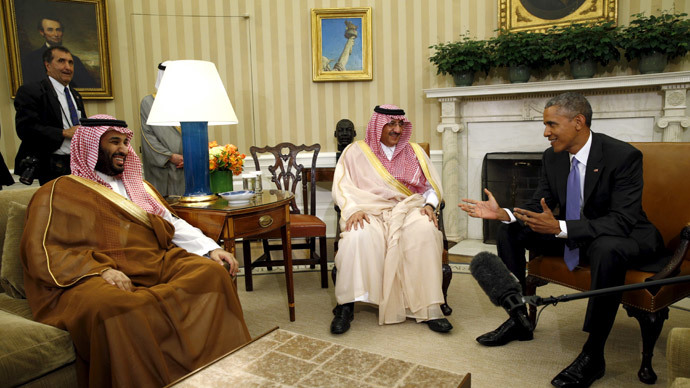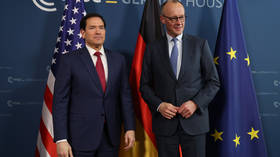‘US closing eyes to Saudi atrocities – sign of extraordinary hypocrisy for Iranians’

The US is accusing Iran of being a “sponsor of terrorism” while ignoring their Saudi allies are slaughtering Yemeni civilians, funding Al-Qaeda, and have occupied Bahrain, said political analyst at Tehran University Seyed Mohammad Marandi.
READ MORE: 'Sponsor of terrorism': Obama slams Iran months after saying it's off terrorist list
President Obama has reassured the Persian Gulf countries that Washington is on their side, despite efforts to clinch a nuclear deal with Iran. In an interview with an Arab newspaper he said Iran is clearly involved in dangerous and destabilizing activities across the region, and called it a “state sponsor of terrorism”. The statements were made on the eve of a Gulf Cooperation Council (GCC) meeting at Camp David – a key US-Arab summit which several Gulf leaders decided to skip.
RT:Obama was at first hailing diplomatic progress at the talks in Switzerland, but how do you explain his latest harsh remarks against Iran?
Seyed Mohammad Marandi: Many in Teheran believe the US is stuck in a very strange position: on the one hand the US speaks about rapprochement with Iran, but on the other hand, it constantly threatens Iran with military strikes and with war. Yet, the US closes its eyes to the reality where the Saudis are destroying Yemen, they are slaughtering many thousands of Yemenis on a daily basis, the Saudis have occupied Bahrain, an independent country, and the Saudis are funding Al-Qaeda in Yemen, in Syria, and extremist groups in Iraq. We know that they helped to create ISIL alongside the Turks.
The Americans are basically calling supporters of extremism and those who advocate Wahhabism across the region and beyond as their allies, countries that bomb other nations and occupy nations. Yet Iran is somehow a threat to the region [and] an exporter of terrorism. For Iranians this is an extraordinary sign of US hypocrisy.
RT:Some commentators say Obama's trying to build Arab support for a nuclear accord with Iran. Do you think that's possible?
SMM: An accord with Iran depends on many factors. One is that the US first has to come to recognize Iran’s sovereign rights. We have to see if that is coming in the next few weeks, the US ultimately has to give up the sanctions regime, and it has to recognize all of Iran’s rights within the framework of the non-proliferation treaty. Beyond that the US had major problems in implementing any agreement because the Saudis and the Israelis as regional allies are very much opposed to any agreement with Iran. Both countries desperately want the region to remain unstable because it benefits them for a host of reasons.

But the ball is in the American court. It is more harmful when the US makes such hypocritical statements. They may shore up support from Saudi Arabia, but I think the international community sees the extraordinarily brutal and barbaric behavior of the Saudi regime in Yemen and how it is destroying a nation and slaughtering innocent civilians. And the people in the international community now know that it is Wahhabism whether it is in Nigeria, Somalia, Libya, Syria, Iraq, Yemen, or Pakistan and Afghanistan, all of this is coming from Saudi Arabia, because it is the official Saudi ideology. Therefore, as long as the US continues to attack Iran and use such language the chances for an agreement with Iran lessen because Iran simply can’t trust the US.
RT:How much could Obama's comments hurt efforts to reach the final nuclear deal which is expected by the end of June?
SMM: When Obama or the Vice President [Joe Biden], or the Secretary of State [John Kerry] says [that] all options are on the table, or that “we may attack Iran,” that is basically sending a message to the Iranian people that “we are threatening you with murder and death.” When the US speaks about terrorism (yet, its closest allies like Turkey are supporting ISIL, Saudi Arabia is supporting Al-Qaeda in numerous countries), when the US says that Iran is the source of [instability], then in Iran people wonder if the US President is so dishonest in his public discourse, then how can we trust him, how can we come to an agreement. It makes it all more difficult for people in Iran and for the negotiators to trust the US when such dishonesty is blatant in the public narrative of the US President, the Congress, and the media in the West.
RT:How much has the US President endangered Washington's traditional alliances in the Gulf region by negotiating with Iran?
SMM: The real question is not endangering these alliances, the question is: are these alliances a good thing for the international community. Saudi Arabia is supporting Al-Qaeda in Yemen. On the other hand the Saudi ideology of Wahhabism is linked to Al-Qaeda, on the other side of the Red Sea and the Gulf of Aden, Al Shabaab is Al-Qaeda. So is it in the interest of the international community to have Al-Qaeda empowered on both sides of these narrow straits? It is a major threat to the international economy; the spread of these extremist groups in Syria, Libya - is this really beneficial?
The US has to think: is its alliance with these countries going to serve any good purpose for the US. The US is not behaving in a moral manner, from the Iranian perspective it is utterly immoral. But is it in the strategic interest of the US? The view from Tehran is that in the long-term US policy by supporting these regimes, enhancing terrorist organizations is going to create a major global problem and it could endanger world trade off the coast of Yemen.

Israel interest – only explanation to US contradictive stance on Iran
Daoud Khairallah, International law professor, Georgetown University shared his opinion on US interests in the Middle East.
RT:Obama is slamming Iran ahead of the Gulf Cooperation Council Summit .What do you read into the timing of these comments?
Daoud Khairallah: I think he wanted to send a message about the purpose of this meeting. Obama is very much in the driver’s seat on this, even though there are noises and a little bit of discontent here and there. But the US and the Obama administration are very much in control of the way things are going. He in one sense is keeping his focus on finishing a deal with Iran on the nuclear issues, and on the other, keeping these allies; they’re more or less feeling a sense of security, declaring to them that he will not give up a very strict control on the Iranian behavior. He labels Iran as sponsor of terrorism and gives them the right to be worried, but he pledges support, he doesn’t go into detail about what kind of support, but he said: The purpose of the meeting is to deepen the cooperation with the Gulf countries starting with Saudi Arabia.
RT:According to some statements of the White House it seems to be favoring a diplomatic approach when it came to Iran. So how much do Obama's comments now threaten those delicate negotiations with Tehran?
READ MORE: ‘Gulf rulers snub Camp David summit: Total disarray of US policy in Mideast’
DK: The US is in a contradictory position: on the one hand it wants to keep Iran in check because Israel is in the first place [among] its Gulf countries, allies. And their fear, anxiety about Iran and the activities of Iran in supporting the Syrian regime, supporting Hezbollah, supporting the Houthis, and this is why Mr. Obama labels it as “sponsoring terrorism”.
[At the same] time, Obama and his administration know that the Syrian regime is the only regime that is credibly fighting terrorism in Syria. Hezbollah in Syria is doing the same thing supporting the regime, fighting terrorism, fighting ISIS and Al-Qaeda derivative al-Nusra and others. The Houthis are fighting Al-Qaeda in Yemen. On the one hand he declared terrorism as the enemy, on the other hand he helps the parties that are fighting or help promoting these terrorists, and he goes against the counties and the forces that are fighting terrorism.
This obvious position [and] obvious contradiction in the US is explainable only because of the Israeli interest in the area. But at the same time he sees a strategic US interest in completing a deal with Iran about the nuclear issues, and to be able to deal with Iran on certain issues in a healthy way that the interest of the US dictates.
RT:The Saudi King will not be at the summit. Will that be taken as a snub by the US?
DK: ... Where would the Saudi King or any other Gulf ruler go? They don’t have anywhere to go. They don’t draw any legitimacy from their own people, they don’t have civil societies. These are groups of rulers who have control of the wealth of their nations that they spend buying influence, buying mercenaries, buying whatever they can buy. I don’t think they are in a position to tell “no” to Obama on any serious issue.
The statements, views and opinions expressed in this column are solely those of the author and do not necessarily represent those of RT.
The statements, views and opinions expressed in this column are solely those of the author and do not necessarily represent those of RT.












